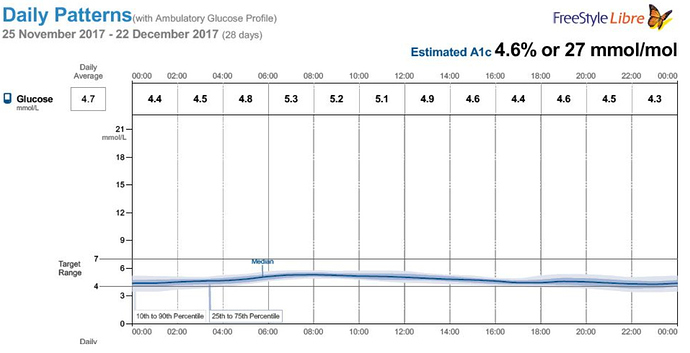Thank you for clearing the thread. I was feeling so bad for hijacking someone else’s!
You assume anyone eating carbs, say 60g, produces a lot of insulin to deal with that. But that’s not so. Not everybody is insulin resistant. Many people won’t see any bump in insulin to deal with a small carb load like that. I’m not talking about myself, unfortunately.
You’re also assuming if one is not eating carbs, insulin is low. Now, I’m talking about myself. I can fast 48h, run on day 1, say 1h, mountain bike on day 2, say 4h, before eating. Been there, done that. I measure BG before this start, it could be high, even though I was having very little carbs before the fast, say, below the 20g. After every bout of exercise, my BG goes up. Up! Recently, after fasting for a blood test, my FBG went from high 90s (after over 12h fast), to above 110 mg/do, while still fasting, hours later. My insulin? 61!
So, eating carbs doesn’t mean high insulin for someone (unfortunately not me) with good insulin sensitivity, just like not eating carbs (or anything for that matter), doesn’t mean low insulin for someone (unfortunately, like myself) who has some degree of insulin resistance (not to the level of diabetes).
But when people talk about these issues, they assume everybody is the same. We aren’t!
You also assume (sorry if I’ve misunderstood) that one needs the stored fat from fat cells to function. What about fat eaten? I’m asking to be sure I understand.
Also, eating so and so carbs doesn’t mean one is cutting calories. One can be maintaining weight and only playing with macros.
It’s my case. I’m happy with my weight. I was keeping my weight before, when I was low fat. I am keeping my weight now, that I’m (very) low carb. The amount of calories? About the same. No magic weightloss (and I don’t mind). Why I do it? Low carb food tastes better AND I want to try increase my insulin sensitivity, hoping that’s possible, but not yet convinced it is.
Just for info: I’m asking questions, just because I’m curious and I want to understand. I have no doubts this WOE is better for me (because of insulin sensitivity issue).



